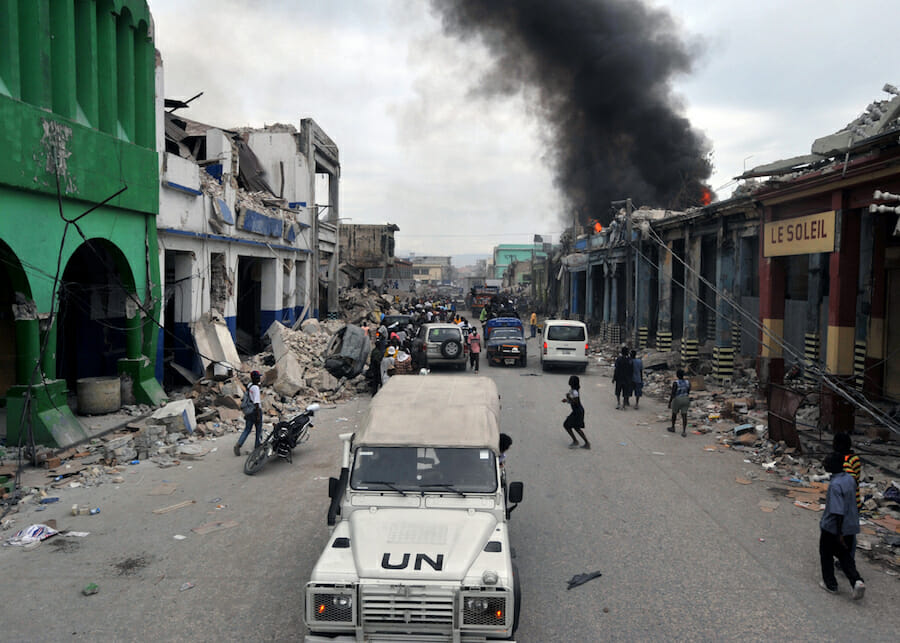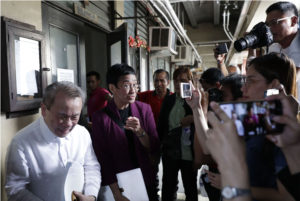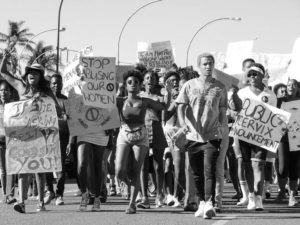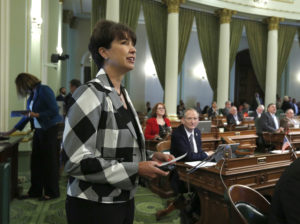When Doing Good Becomes Doing Bad
Sexual abuse by members of organizations that provide relief to some of the world’s most vulnerable people has been more pervasive than recently reported. A United Nations vehicle patrols the streets of Port-au-Prince, Haiti, in the aftermath of the January 2010 earthquake. (Marcello Casal Jr/ABr / CC BY 2.5)
A United Nations vehicle patrols the streets of Port-au-Prince, Haiti, in the aftermath of the January 2010 earthquake. (Marcello Casal Jr/ABr / CC BY 2.5)
Oxfam wasn’t the only nongovernmental organization (NGO) in Haiti where the so-called protectors turned into predators. After the 2010 earthquake, thousands of foreign aid workers arrived in the country. In Port-au-Prince, women on the streets reported that foreigners would give them more than five times the price a local would pay for sex.
Recent revelations of sexual abuse implicating specific NGOs and other agencies that provide relief to some of the world’s most vulnerable people are more widespread than initially reported. The most-publicized depredation involves the former Oxfam country director in Haiti, Belgian Roland van Hauwermeiren, who acknowledged paying for sexual encounters with Haitian earthquake survivors in a villa at odds with a disaster-ridden landscape.
Taina Bien-Aimé, director of the international Coalition Against Trafficking in Women (CATW) and a first-generation Haitian-American and colleague, told me, “To understand the scandal of sexual abuse in Haiti is to understand the country’s history of debilitating colonialism. The history of Haiti for the majority of Haitian women and girls is also an historical arc of sexual violence and harassment at the hands of foreign military men, NGO workers, U.N. personnel and others.”
Haiti has been ravaged by rapacious nations, initially enslaved under French domination combined with a concomitant U.S. economic blockade. Later, in 1915, the U.S. Marines invaded the country and, many say, have never left.
In more recent times, the sexual exploitation of women in Haiti has been carried out by countless waves of U.N. peacekeepers entrusted with helping the country withstand internal conflicts and natural disasters. From 1990 to the present, at least nine United Nations aid operations were assembled to support the people of Haiti. The acronyms multiply: ONUVEH, MICIVIH, MINUHA, MANUH, MITNUH, MIPONUH, MICAH, MINUSTAH, and finally MINUJUSTH. All variously spell out missions intended to assist, stabilize, verify elections, aid in transition, establish a civilian police and build a justice system in the country.
A 2017 U.N. report found that sexual abuse by U.N. peacekeepers in Haiti was pervasive over a period of seven years. The record of sexual exploitation during the United Nations Stabilisation Mission in Haiti (MINUSTAH) is the longest—a decade of rape, sexual assault and prostituting that left a legacy of what are called MINUSTAH babies in a country where 59 percent of the population lives below the poverty line and almost 25 percent exist in abject poverty.
Haiti, the first country in the Western Hemisphere and the first black nation to abolish slavery, has found itself at the epicenter of a tsunami of sexual slavery that struck Haitian women and has continued for years. Slavery is a fortissimo word for this large-scale sexual exploitation of women and children, what some would prefer to mute as “survival sex.” But if you are desperate for money or medicine, or you need to feed hungry children by providing sex in exchange for bread, milk or food coupons, your survival is your servitude.
In addition to Oxfam, recent revelations of NGO sexual exploitation have involved the larger corporate-style organizations, including Médecins Sans Frontières (Doctors Without Borders), and the International Committee of the Red Cross (ICRC). These organizations are flush with funds and led by high-salaried directors.
Some NGOs have enacted policies on prostitution that provide an enabling environment for the sexual exploitation that takes place both within their organizations and on country missions. Amnesty International’s prostitution policy transforms prostitution into “sex work” by arguing that decriminalization of not only prostituted women but also of pimps and buyers is the best way of protecting women. Ken Roth, director of Human Rights Watch, cheered on Amnesty’s proposal as a praiseworthy poverty program for underprivileged women when he tweeted, “Why deny poor women the option of voluntary sex work?”—a question reminiscent of the chorus of johns who justify their sexual exploitation by transforming it into a welfare system for the women they abuse.
I contacted Oxfam to inquire whether the organization has a policy prohibiting staff from buying “sexual services.” Media have reported that organizational guidance issued in 2006 stated that Oxfam “did not ban the use of prostitutes, but we strongly discourage it. We don’t ban it because we cannot infringe on people’s liberties.” When I asked Tricia O’Rourke, head of news at Oxfam Great Britain, about Oxfam’s 2017 policy, she responded, “Our code of conduct now states that staff cannot ‘exchange money, offers of employment, employment, goods or services for sex or sexual favors.’ The previous code prohibited sex with people in direct receipt of aid—we admit it was wrong not to explicitly prohibit staff from engaging in any kind of transactional sexual behavior and deeply regret this.”
In February, Oxfam’s chief executive, Mark Goldring, was called to account for why Oxfam’s sexual abuse of Haitian women was not disclosed to the U.K. government, its primary funder. The Daily Telegraph reported that Goldring was “expected to claim that Oxfam had not informed ministers of the allegations in 2011 because it believed that staff accused of paying prostitutes were not guilty of exchanging ‘sex for aid.’ ” It appears that the Oxfam executive made a distinction between using women in prostitution (OK) and trading “sex for aid” (not OK), and in doing so, at that point in time, was ignorant of the organization’s 2017 revised code of conduct.
After the Oxfam scandal, Médecins Sans Frontières (MSF) announced it had “dealt with” 24 cases of sexual harassment and abuse in 2017, all involving field staff and almost all in mission countries. Nineteen people were dismissed from the organization. When I inquired about its current policy on sexual harassment and abuse, MSF responded that it has a no-tolerance policy that applies to minors and adults. Seeming to contradict the policy, MSF also added, “there is no one global code of conduct for all MSF offices and missions,” although each of its 21 different sections shares the same “binding commitment and vision.”
When asked whether it prohibits its personnel from purchasing “sexual services,” MSF told me, “There is current discussion within MSF to reinforce our policy on sexual exploitation, by explicitly addressing the specific issue of buying services from sex workers, in guidance to all staff.” Yet when asked whether it takes any position on Amnesty International’s policy of full decriminalization of the sex industry, MSF pointed me to its teams in South Africa that, in a response to the South African Law Reform Commission’s report on prostitution, condemned the report for not supporting decriminalization of the sex industry. Instead, MSF South Africa “supports the decriminalization of sex work” and stands “in solidarity” with pro-sex trade groups such as SWEAT and the Sisonke Sex Worker Movement. The organization makes no mention of groups that oppose decriminalization of the sex industry in South Africa, such as Masimanyane or Dignity, both representing survivors of prostitution.
The International Committee of the Red Cross is also on the roster of big corporate NGO abusers. ICRC director Yves Daccord has acknowledged that 21 staffers violated the organization’s policy by paying for “sexual services.” No details of where the sexual exploitation took place were released.
To its credit, the ICRC has long included in its code of conduct an explicit proscription against staffers purchasing “sexual services.” Daccord affirmed that “the ban applies worldwide and at all times, including in locations where prostitution is legal, as the ICRC believes that staff paying for sex is incompatible with the values and mission of the organization.” The ICRC’s policy is contractually binding. Daccord has contacted other NGOs with the goal of preventing offenders from being shifted from one agency to another, a common NGO practice.
And then there was the annual men-only charity benefit in Britain sponsored by the corporate businessmen of the Presidents Club, who for years allowed powerful titans of business, politics, finance, media, entertainment and government to prey on young women at the event. In January, the club hired 130 “hostesses”—who were ordered to wear skimpy, body-clinging, black outfits with matching underwear and high heels—to provide “services” to the male guests. Procured from the Artista agency, the women were told to make men happy. During the event, Artista also showed videos of women dancing in their underwear.
Paraded in at the start of the evening, hostesses were made to smile and strut across the stage for men’s gaze before walking to their assigned tables as the men whistled, cheered and clapped. According to one hostess, certain women wore soaring red heels or red belts so they could be identified as available for “extra duties,” i.e., for sex. As the event went on, alcohol and drugs flowed freely, and the sexual demands became more forceful. One shocked businessman said, “It’s a cesspit … it’s just an upper-class whorehouse.”
At the event and especially at the after-party, where the hostesses were required to stay until 2 a.m., they were groped and propositioned. The harassment included being fondled repeatedly, pulled onto men’s laps, asked to remove their underwear, and invited to men’s rooms in the hotel. Men exposed themselves and asked women if they were “prostitutes.” Caroline Dandridge, the founder of Artista, told the women to just tell the men, “You’re a naughty boy.” The benefit auctioned off nights at a strip club and a course of plastic surgery that invited men to “add spice to your wife.”
The benefit was not merely an event that got out of hand, with a few rogue men behaving badly. It was deliberately designed to prey on young women and allow the male attendees sex on demand. Apparently, the club was able to mask its misdeeds for 33 years because it raised millions of pounds to aid those in need. The women were made to sign nondisclosure agreements.
Is it surprising that NGO executives and staffers are acting like the corporate businessmen at a Presidents Club benefit? Some, like Goldring at Oxfam, explain their organization’s sexual abuse based on a distinction between “sex for aid” and prostitution. Commentators such as Suzanne Moore, writing in The Guardian, appear to make this same distinction. She claims that Oxfam’s abuse of vulnerable women, while it is “vile exploitation,” is not prostitution because “prostitution implies choice and consent. However, it is not clear how any choice was made, in the devastating aftermath of the Haiti earthquake.”
Minus an earthquake, what does it take to understand that it is not clear how any choice is made for the majority of women in prostitution?
The privileged male abusers of Haitian women are not much different from the privileged male abusers who prowl the streets of major cities in the United States looking “to score,” or who gratify themselves in the legal brothels of Germany, the Netherlands or Nevada. The women they exploit are mostly women whose alleged choice and consent is driven by family breakdown, past and present sexual abuse, poverty, substance abuse and/or a predatory recruiter or pimp who smooths the way–no choice at all, really.
Policies legalizing or decriminalizing the sex industry seem based on a sliding scale that makes distinctions between “especially vulnerable women” and “not-so-vulnerable women.” Should we distinguish between “especially vulnerable women” on the streets of Haiti who swap sex for necessities and those who allegedly are “not so vulnerable” because they provide sex for money in Haiti’s sex clubs and bars? Or is the sliding scale more accurate if we acknowledge that all women who resort to prostitution in Haiti are “especially vulnerable” but not women in European or U.S. sex venues because the latter have more “choice”?
Amnesty International’s prostitution policy has further confused general NGO policy on prostitution by giving prostitution users permission to abuse women, rationalizing that decriminalization of the sex industry benefits women and allegedly preserves their right to prostitute. But whose rights are really being protected here? Amnesty’s policy provides validation for men who would abuse vulnerable women and—like other NGO perpetrators and the corporate abusers of the Presidents Club—call it charity, protection or economic welfare.
There have been many protests in the wake of these NGO scandals. On International Women’s Day, women aid workers published an open letter to senior managers, CEOs and board members of humanitarian and development organizations, demanding reform of the corporate NGO culture that permits sexual harassment and exploitation. The #MeToo movement has also removed impunity from many high-flying and wealthy sexual abusers prominent in Hollywood, the media and women’s sports.
Much has been said about the need to change the culture of organizational sexual abuse—a culture that in large measure is built on the culture of prostitution. Prostitution has been much in the background of the #MeToo movement but much in the foreground of many men’s lives. We need to acknowledge how prostitution and the sex industry are major propellants of the sexual abuse endured by women in everyday life.
Prostitution is the arena in which sexual harassment and abuse are normalized and repeated in nearly every sexual encounter—where sexual abuse is justified because she allegedly consents to it, and he pays for it. Prostituted women experience daily the sexual sadism aimed at women in the entertainment media and the violent acts depicted in gonzo porn—the most debasing genre of pornography that dominates the pornography market. Media sexual sadism and pornography have also been instrumental in desensitizing men to the “regular” sexual abuse they inflict on many women outside of prostitution, abuse for which the #MeToo movement has made men accountable.
Pimp culture has invaded our language, making it hip to use the word. Billboards advertising “pimp smooth” beer, marketers who “pimp” their products and a TV show called “pimp my ride” all pass, especially in youth circles, for something cool. One need not understand the multiple meanings this word conveys in different contexts to know that using that term ignores the actual consequences that pimping inflicts on prostituted women and girls.
I asked prostitution survivor Autumn Burris, director of Survivors for Solutions, about the connections between the sexual exploitation reported by women in the #MeToo movement and the sexual abuse of prostitution. In what has now become a legendary tweet, she responded that prostitution is “#MeToo on steroids.” When asked about her tweet, Burris explained that prostituted women are subjected “to hourly sexual harassment, rape, unwanted advances/penetration and aggressive and violent behavior by white, privileged men sexually commodifying our bodies.”
How can we change the NGO culture of sexual abuse and assault when certain human rights organizations have institutionalized pimping and buying a woman’s body for sex as basic freedoms to protect? How can we change the general culture of sexual abuse and assault if those whose very mission is to do good are doing bad?
Your support is crucial…With an uncertain future and a new administration casting doubt on press freedoms, the danger is clear: The truth is at risk.
Now is the time to give. Your tax-deductible support allows us to dig deeper, delivering fearless investigative reporting and analysis that exposes what’s really happening — without compromise.
Stand with our courageous journalists. Donate today to protect a free press, uphold democracy and unearth untold stories.









You need to be a supporter to comment.
There are currently no responses to this article.
Be the first to respond.